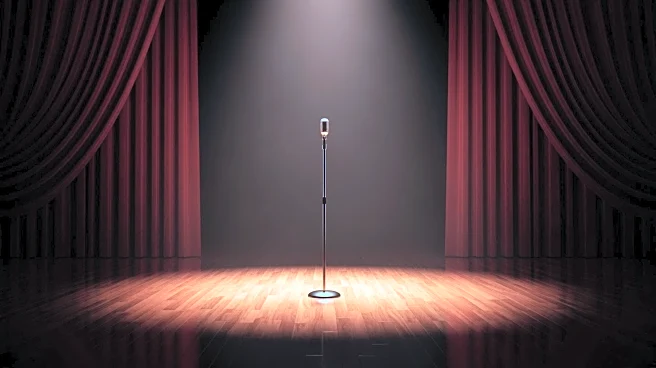What's Happening?
David Roussève, a renowned dance icon and professor, is set to premiere his new solo performance titled 'Becoming Daddy AF' at UCLA's Center for the Art of Performance. This marks his first evening-length
solo in over two decades. The performance is a meditation on life's purpose, exploring themes such as genealogy, the aging body, and the power of love. Roussève's movement vocabulary, a fusion of street, jazz, and modern dance, is adapted to reflect the wisdom of an aging body. The piece has undergone several developmental residencies and will debut on October 17 and 18. Roussève's collaborative process involved feedback from students and mature artists, emphasizing the beauty and wisdom of the older body in dance.
Why It's Important?
The premiere of 'Becoming Daddy AF' is significant as it highlights the evolving nature of dance and the role of mature artists in the field. Roussève's work challenges traditional notions of virtuosity, offering a nuanced perspective on the capabilities and desires of an aging body. This performance not only contributes to the discourse on age and artistry but also underscores the importance of interdisciplinary collaboration in the arts. By engaging with students and seasoned artists, Roussève fosters a dialogue that bridges generational gaps, enriching the cultural landscape and inspiring future artists.
What's Next?
Following the premiere, 'Becoming Daddy AF' may influence discussions on age and performance in dance, potentially leading to more opportunities for mature artists. Roussève's approach could inspire other choreographers to explore similar themes, expanding the representation of older bodies in dance. Additionally, the performance may prompt academic institutions to reconsider their support for interdisciplinary and collaborative art projects, recognizing their value in fostering innovation and inclusivity.
Beyond the Headlines
Roussève's work reflects broader societal themes, such as the intersection of art and academia, and the role of the arts in addressing political and social challenges. His belief in the transformative power of the arts and humanities highlights their potential to foster empathy and dialogue across differences, offering a counterbalance to the focus on STEM fields. This perspective advocates for a holistic approach to education and cultural development, emphasizing the need for compassion and understanding in today's world.










